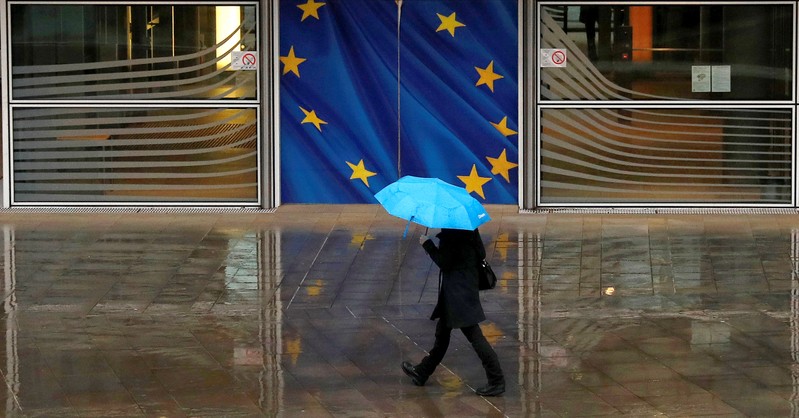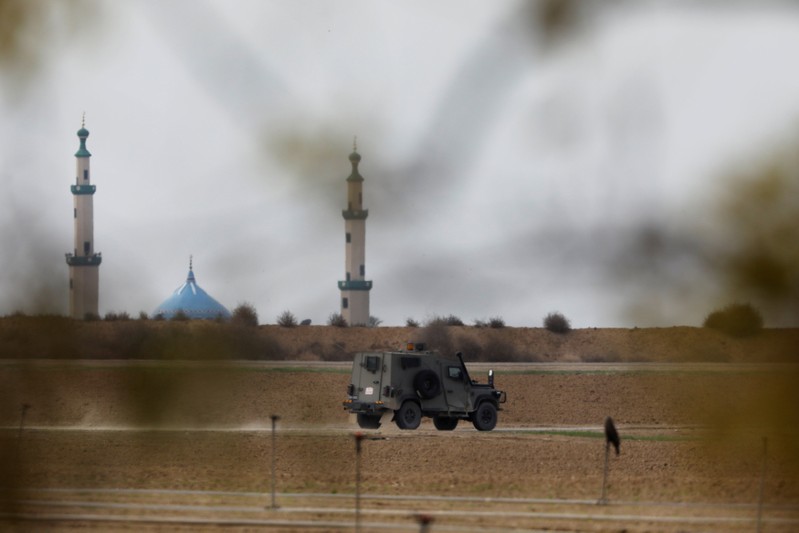
A woman holds an umbrella as she walks past the flag of the European Union outside the European Commission in Brussels, Belgium, December 13, 2017. REUTERS/Phil Noble
December 14, 2017
By Robin Emmott
BRUSSELS (Reuters) – European Union nations are set to achieve a 70-year-old ambition to integrate their defenses on Thursday, signing a pact between 25 EU governments to fund, develop and deploy armed forces together after Britain’s decision to quit the bloc.
First blocked by the French parliament in the 1950s and later by Britain, which feared an EU army, the pact aims to end the squandering of billions of euros by splintered defense policies and Europe’s heavy reliance on the United States.
“Today is an historic day,” said EU foreign policy chief Federica Mogherini, who helped push through Franco-German plans for defense integration. “This turns the European Union into a credible security provider,” she said on arrival at the summit where EU leaders will inaugurate the pact.
France’s President Emmanuel Macron said “concrete progress” had been made, and Dutch Prime Minister Mark Rutte said the pact would make the EU more agile abroad.
“This is not about replacing NATO, it is about being more flexible and using our resources better,” Rutte told reporters.
Leaders will formally endorse the pact – known in EU jargon as Permanent Structured Cooperation, or PESCO – at 1845 CET (1745 GMT), in one of the most tangible steps in EU integration since Britain voted to leave the bloc.
Defenses integration was revived by France and Germany, with support from Italy and Spain, in a show of unity after Brexit.
A bigger impetus came from failings in the 1990s, when EU governments were unable to act in the Balkan wars and relied on U.S.-led NATO to stop the bloodshed on their doorstep.
In Libya in 2011, a Franco-British air campaign ran out of munitions and equipment and was again forced to turn to the United States, in what is considered an enduring embarrassment for the European Union, a major economic power.
Caught off guard by Russia’s Crimea annexation in 2014 and facing threats ranging from state-sponsored computer hackers to militant attacks, EU governments appear to have overcome their aversion to working together in military matters.
U.S. President Donald Trump’s criticism of low European defense spending, a host of divisions on foreign policy, and Trump’s warnings to allies that they could no longer rely on the United States if they did not pay up have also played a role.
“It’s sad that we needed Donald Trump to give us a boost, but whatever, it is the right outcome,” said former German foreign minister Joschka Fischer, who as minister backed NATO’s intervention in Kosovo in 1999 but opposed the 2003 Iraq war.
NATO SUPPORT
Unlike past attempts at European defense integration, NATO backs the project, but NATO Secretary-General Jens Stoltenberg, who is attending part of the summit, urged against duplication. Twenty-two EU countries are also members of NATO.
“There has to be coherence between the capability developments of NATO and the European Union. We cannot risk ending up with conflicting requirements from the EU and from NATO to the same nations,” he told reporters
“Forces and capabilities developed under EU initiatives also have to be available for NATO because we only have one set of forces,” Stoltenberg said.
Issues still remain about financing future EU missions. An EU defense fund, with money from the European Commission for the first time, still needs to be approved, although a pilot phase is already underway for defense research.
In one irony noted by EU diplomats, British Prime Minister Theresa May, who is attending the summit, will witness the debut of a project championed by Britain in the late 1990s but of which it will not be part, along with Denmark and Malta.
A 1998 Anglo-French EU defense accord is considered the genesis of Thursday’s agreement. In a possible compromise on PESCO, Britain may be able to join in later on, but only on an exceptional basis if it provides funds and expertise.
(Reporting by Robin Emmott; Editing by Larry King)

